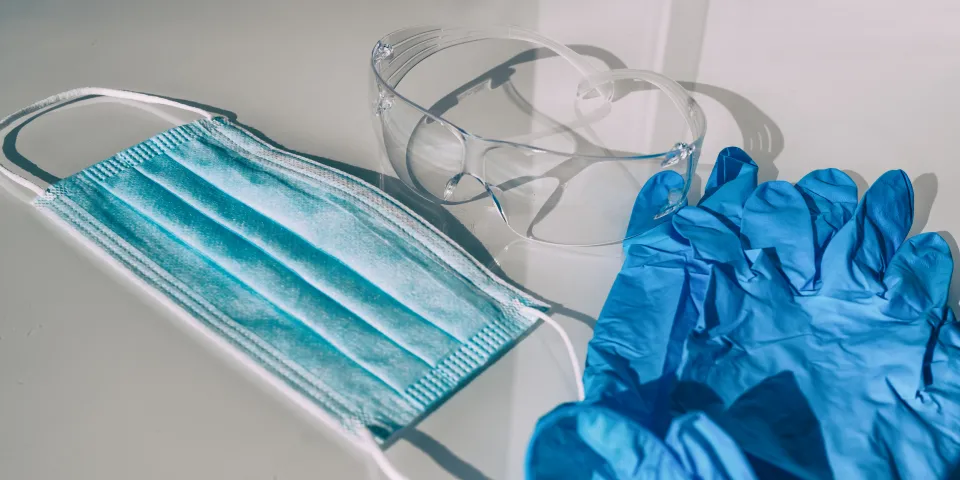Latest
Q&A Part 1: Becoming a Nurse during the Coronavirus Pandemic
Jan 25, 2021

During the coronavirus pandemic, nurses have been hailed as frontline heroes because they provide day-to-day care for patients stricken by the virus while trying to keep themselves and other patients safe.
We asked some student nurses who have graduated in the last year and started their careers in the midst of the healthcare crisis.
- Richard Onyait, who graduated from Herzing-Madison with his Bachelor of Science in Nursing (BSN) in January 2021. He’s currently working as a caregiver and plans to be an emergency room RN.
- Victoria Hartwell, an April 2020 Associate of Science in Nursing (ASN) graduate from the Orlando campus who started working as an RN at a long-term care facility in Florida later that summer.
Here is a look at how they have adapted to working during a pandemic:
1. What changed with nursing school and your job since the pandemic started?
Richard: I was nearing the end of my BSN program when the pandemic struck. Unfortunately, we had to end my clinical experience at a mental health facility early. We switched to virtual simulation clinicals for the rest of that spring semester and I was able to start in-person clinicals again in September. The uncertainty of what would happen was challenging to deal with. With my job, I was providing in-home care to a high-risk patient, and I had to be extremely careful and mindful not to expose him to the virus. I made sure to shower every time I entered the home and took extra caution with limiting my own potential exposure.
Victoria: I was almost done with nursing school when the coronavirus started, but I did have to finish some of my clinical experiences virtually. When I applied for my job at the long-term care facility last summer, they originally asked if I would work in their COVID wing. I was fully prepared to do that, but fortunately, cases were down within a few weeks and they closed the wing.
The facility follows strict protocols to keep everyone safe, and everyone does a great job of following them. All staff members are tested weekly for the virus, and if anyone is positive, the entire building, residents included, are tested. As of now, residents only leave the facility for doctor’s appointments. We don’t allow visitors in the building, although some family members can meet with their loved ones during socially distanced outdoor visits.
2. What has been your biggest challenge working during the pandemic?
Richard: The biggest challenge for me has been not being able to interact with patients as much as I want to. All of the PPE, including gowns, face shields, etc., can get in the way of truly connecting with patients.
Victoria: Wearing a mask all day is a huge challenge. Not because it’s hard to breathe, but because it causes a lack of connection with my patients. Non-verbal communication is missing and we can only see each other’s eyes. While the mask creates a barrier between us, I feel confident knowing I’m protecting myself and my patients. Another challenge is communicating with family members who can’t visit their loved ones. There’s an emotional heaviness that comes with this.
3. What has been most rewarding?
Richard: Being able to put a smile on someone’s face in the midst of pain. While I didn’t work directly with COVID patients, giving my patients hope that, yes, this is tough, but we can get through it. It gives me purpose.
Victoria: Whenever I get to see a patient go home, I feel like I’ve accomplished something. Watching patients rehab successfully is so rewarding!
4. Did the pandemic change how you feel about becoming a nurse at all?
Richard: When the pandemic struck, I felt like, “I wish I was ready to help right now.” That hasn’t changed. I never felt scared, and I’ve always felt called to help people when they’re in pain. I prayed and was grateful for those doing the work on the frontline.
Victoria: It might sound strange, but I was excited to finish school so I could get out and help. I wanted to take an active role in fighting the virus, rather than feeling stuck not being able to do anything.
5. What is it about being a nurse that helps you get through times like these?
Richard: For me, it’s a calling to be a nurse, and it’s a blessing to have found my calling. I want to give patients a glimmer of hope and let them know we’ll do the very best we can to take care of them. That is what gives me strength and satisfaction. Knowing that I could make one more life better or save one more person is why I wake up every morning.
Victoria: Being a nurse and being able to share my strength, dignity and compassion with those who need it the most helps me through the rough times. Having suffered some personal losses during 2020, it has been my job and my coworkers who helped keep me going when I wanted to give up. Having to take care of someone physically and emotionally is what helped me through the pandemic and my own personal battles.
6. What advice do you have for others considering becoming a nurse right now?
Richard: Nursing is a wonderful profession, but it’s also a calling. If you’re dedicated to helping people, we need you and we want your help in this battle. It’ll take resilience, determination, unwavering commitment and hard work.
Victoria: Pandemic or not, find a good group of classmates who are in it with you, so you can help support each other. Not just with the coursework, but also with the stress that comes with nursing school. Sharing frustrations, joy and sadness is really important.
Are you interested in learning more? Read the second part of this interview!
Learn More About Our Nursing Programs
Bureau of Labor Statistics (BLS), U.S. Department of Labor, Occupational Employment and Wage Statistics 2023 / Occupational Outlook Handbook 2022. BLS estimates do not represent entry-level wages and/or salaries. Multiple factors, including prior experience, age, geography market in which you want to work and degree field, will affect career outcomes and earnings. Herzing neither represents that its graduates will earn the average salaries calculated by BLS for a particular job nor guarantees that graduation from its program will result in a job, promotion, salary increase or other career growth.
Latest
Recent Blog Posts
Subscribe to our Newsletter
Get the latest news you need to know, from study hacks to interview tips to career advancement. Have it delivered right to your inbox biweekly.








